Ancient Israel's Neighbors-2
Chris Knepp
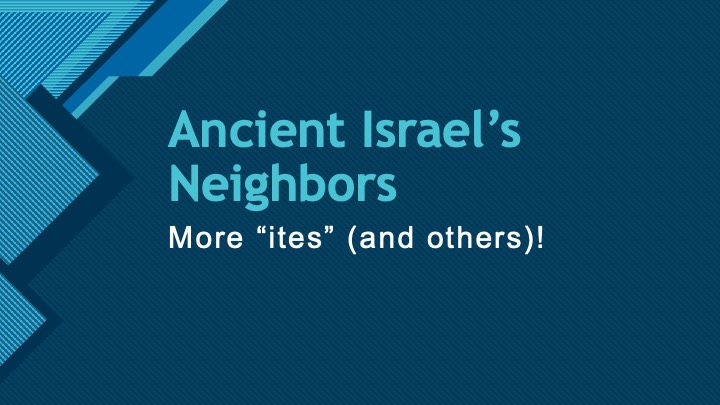
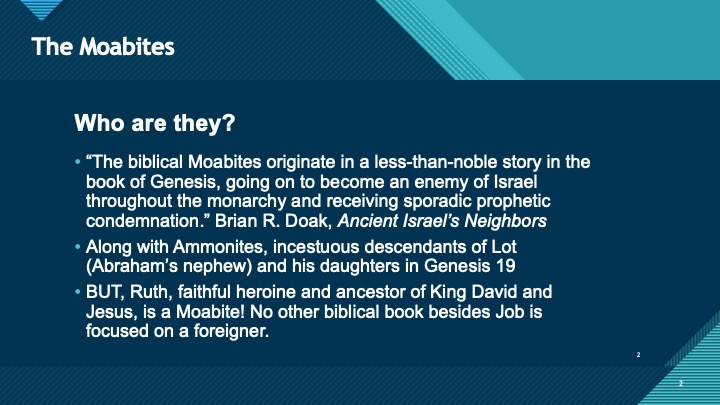
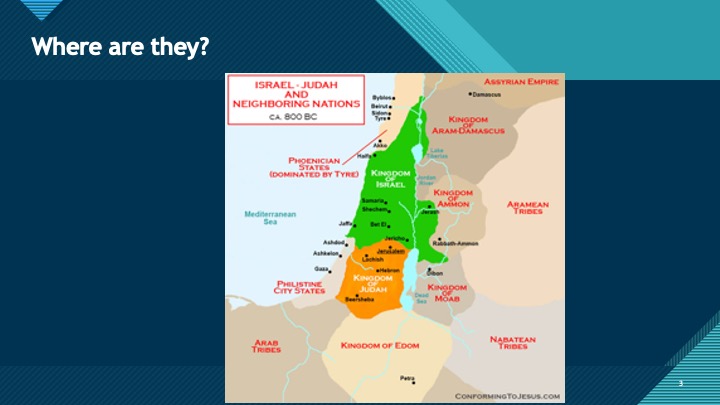
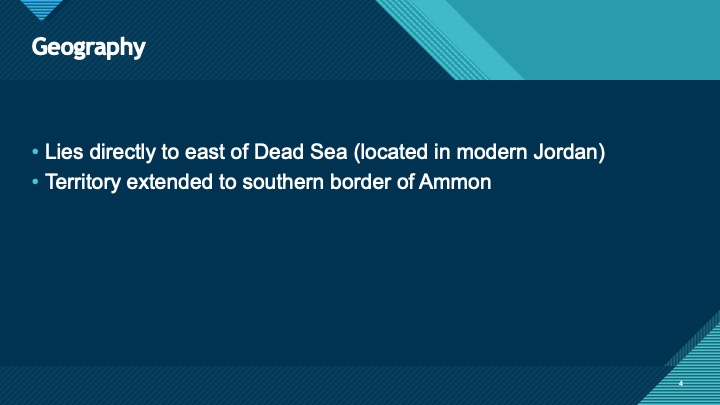
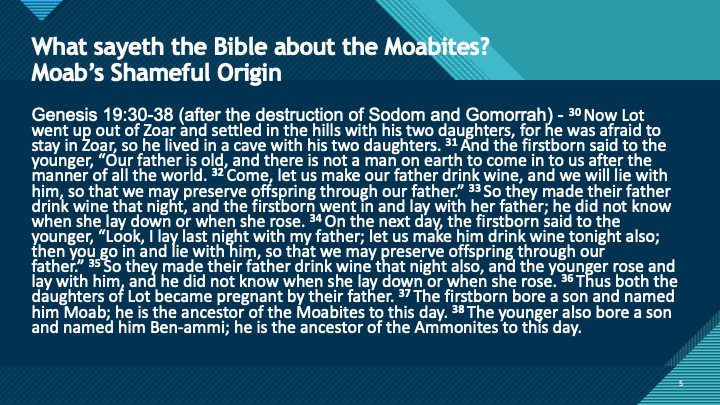
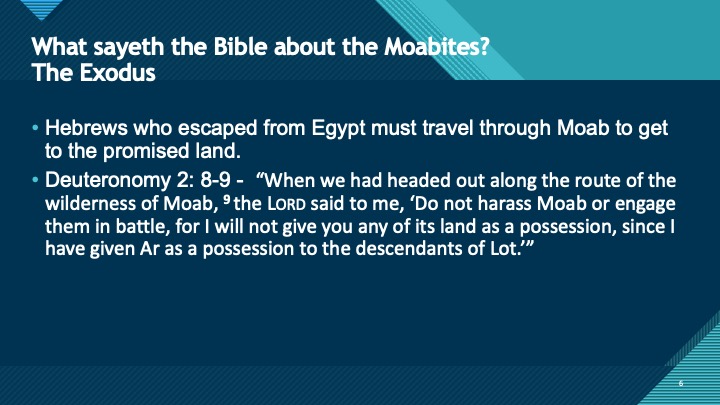
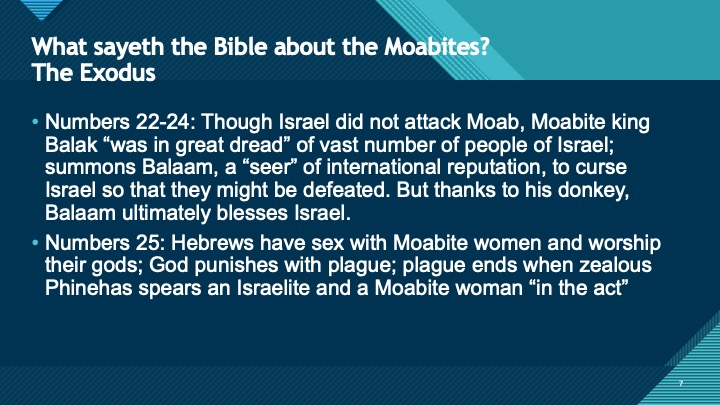
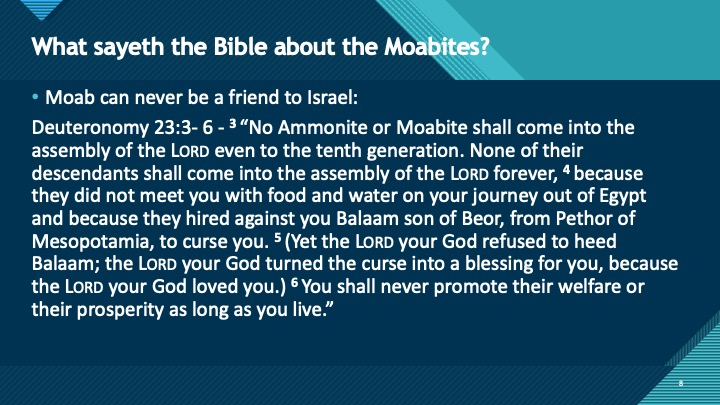
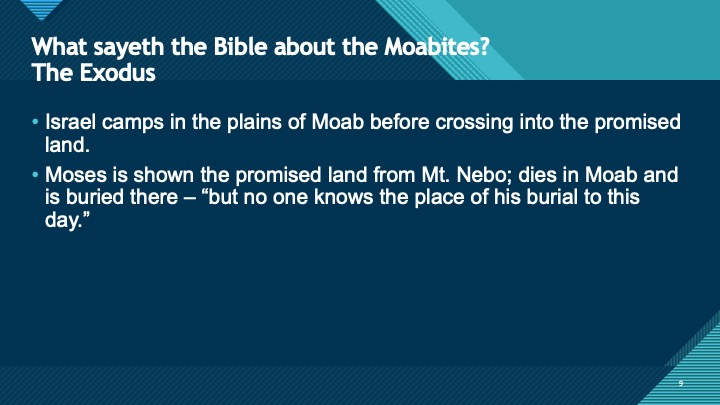
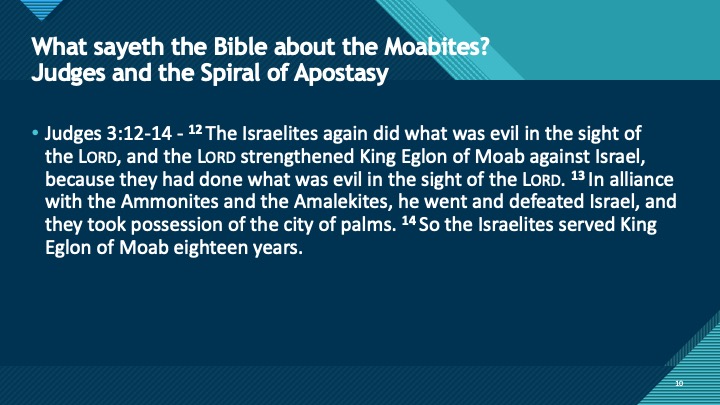
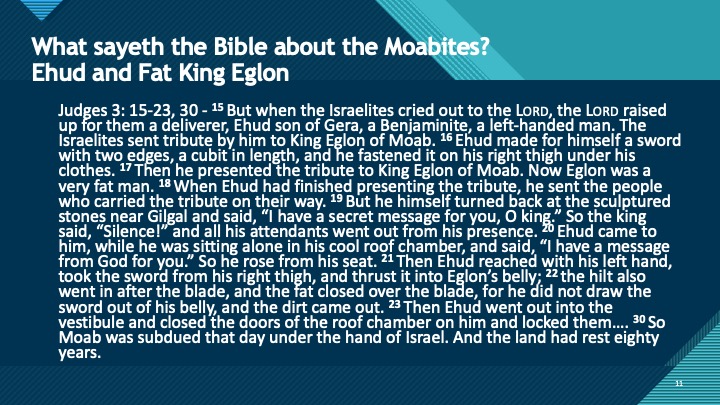
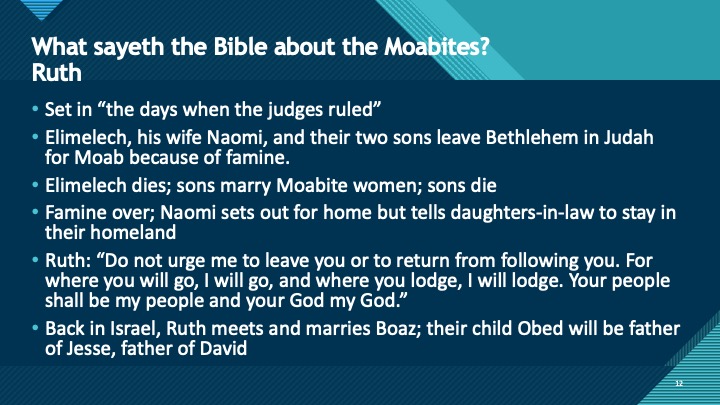
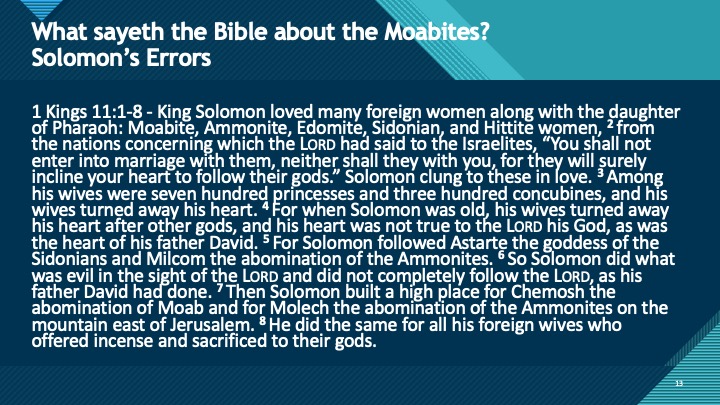
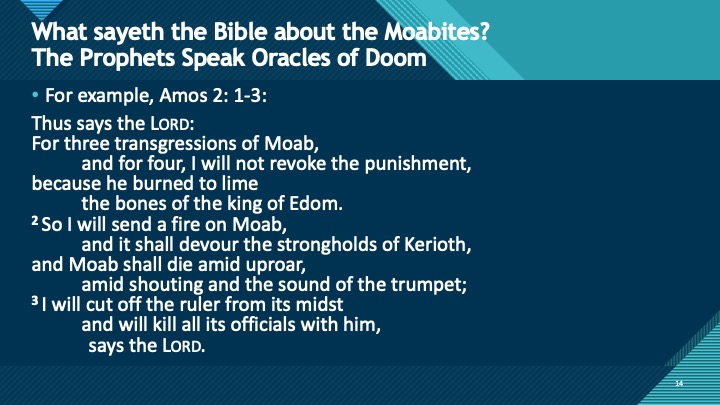
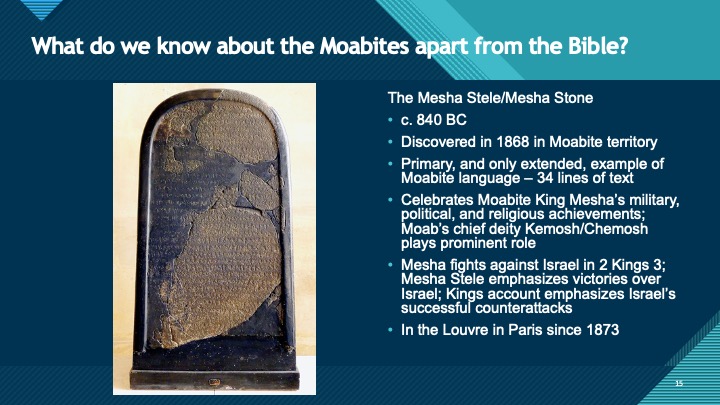
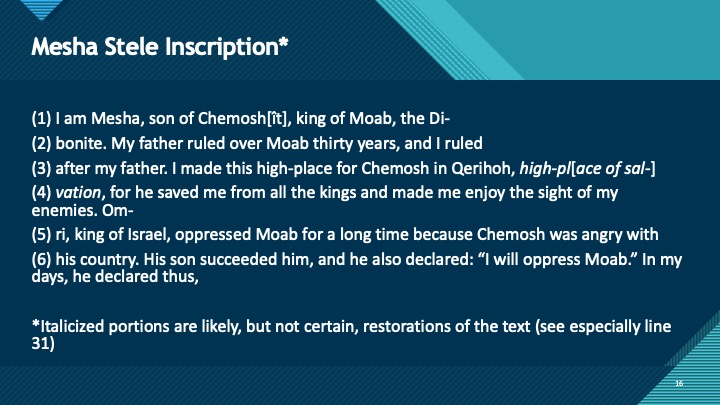
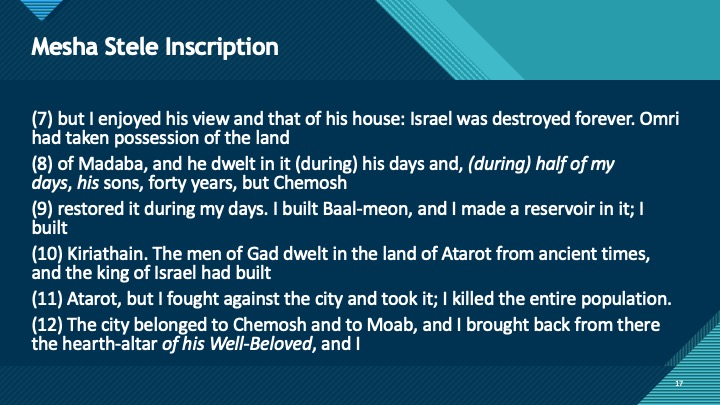
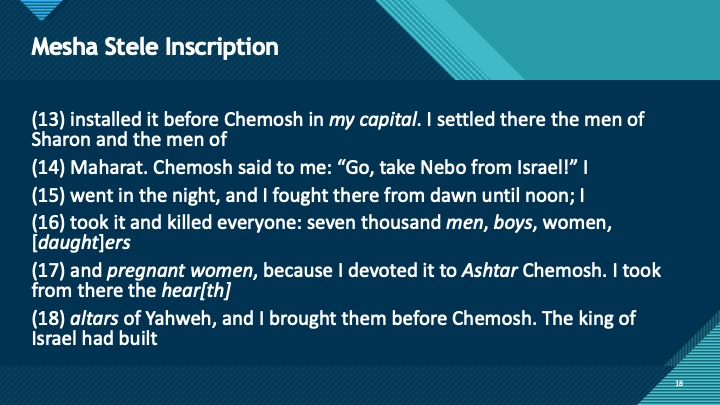
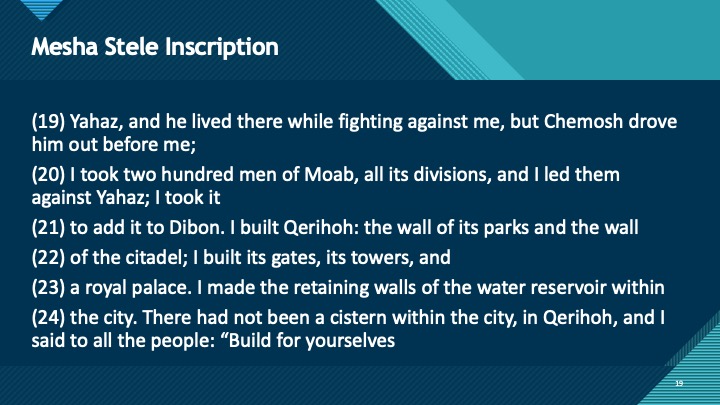
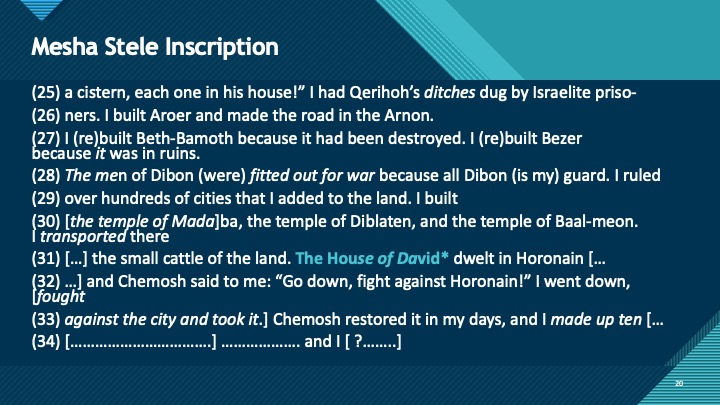
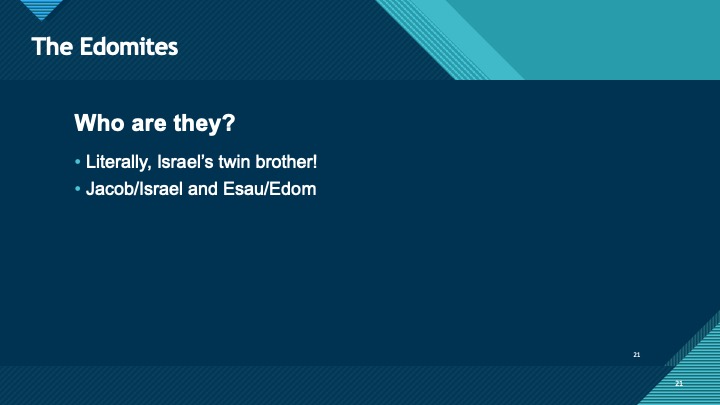
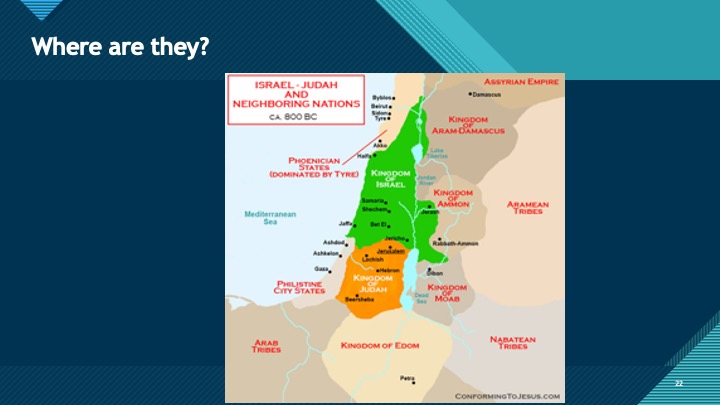
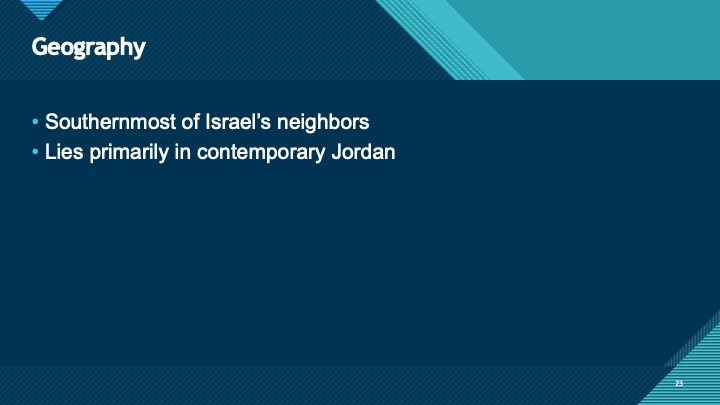
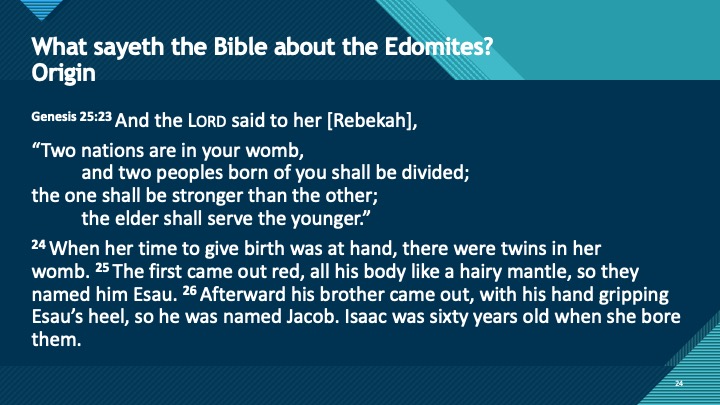
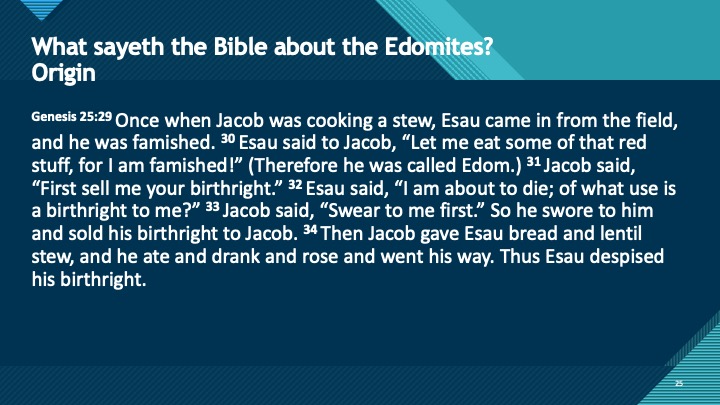
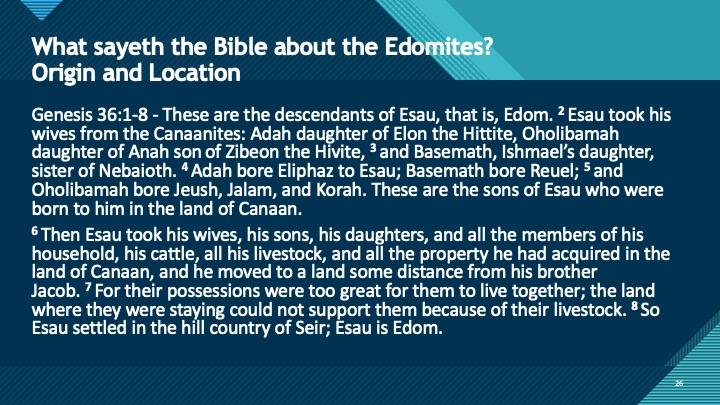
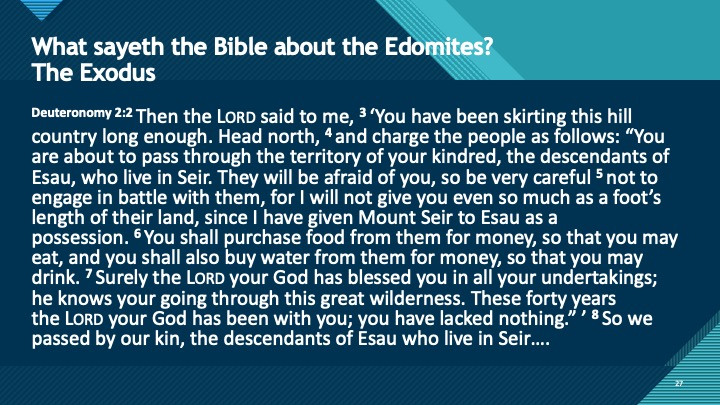
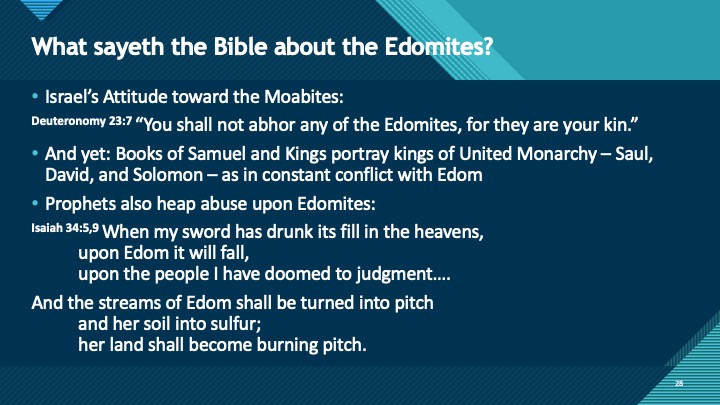
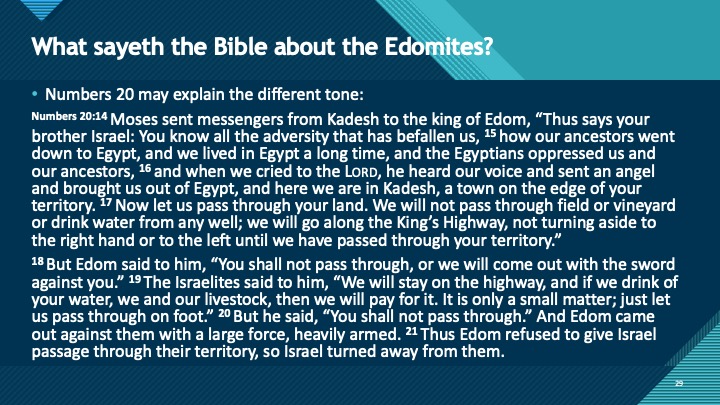
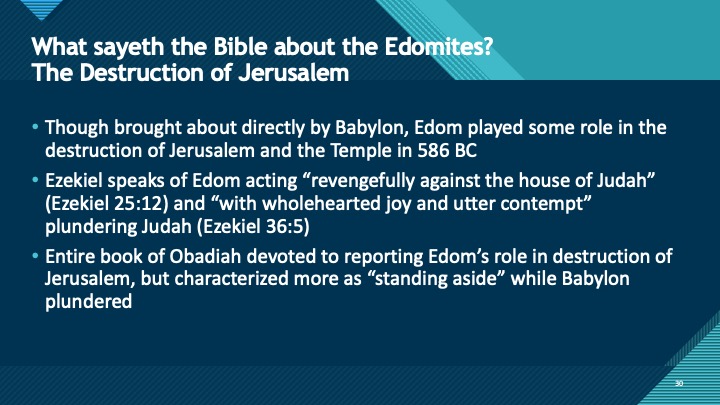
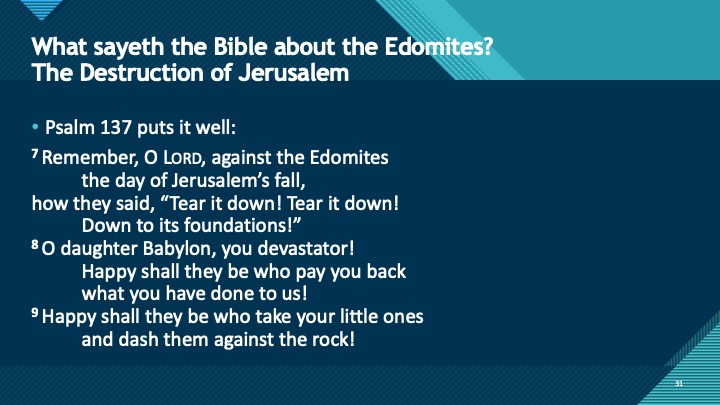
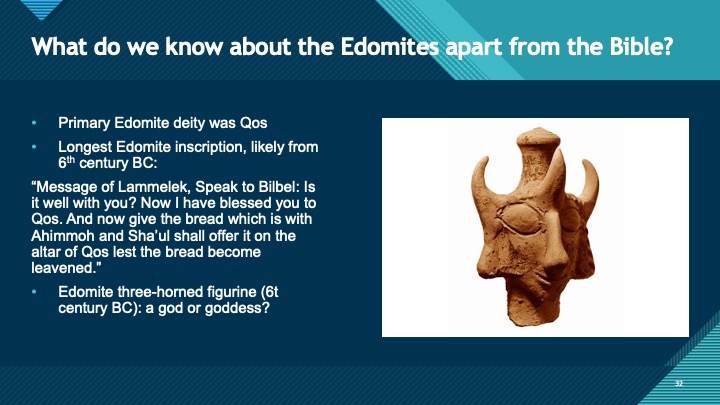
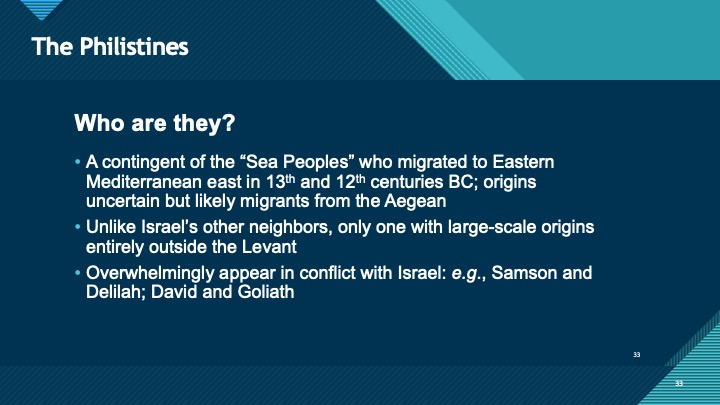
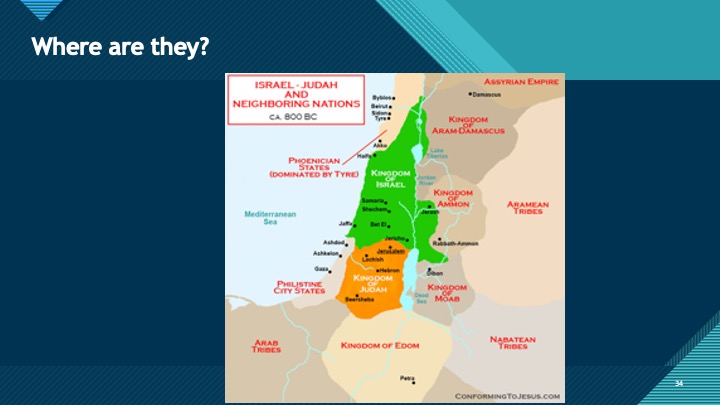
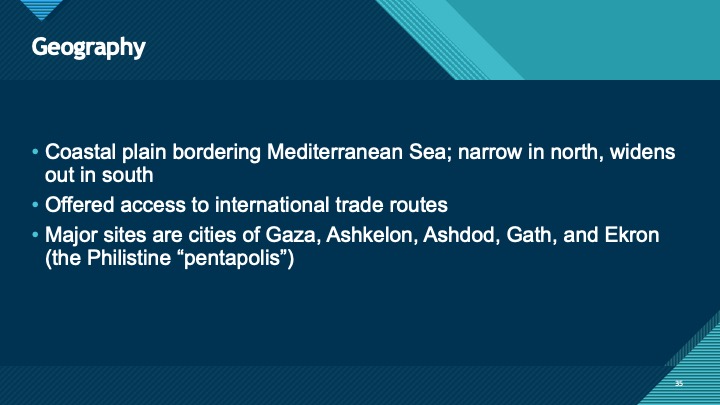
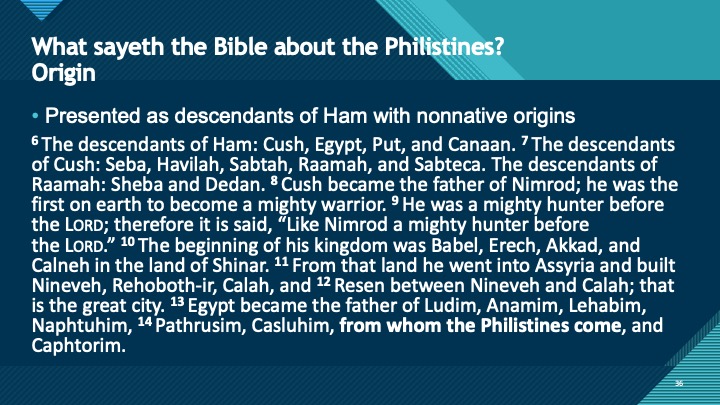
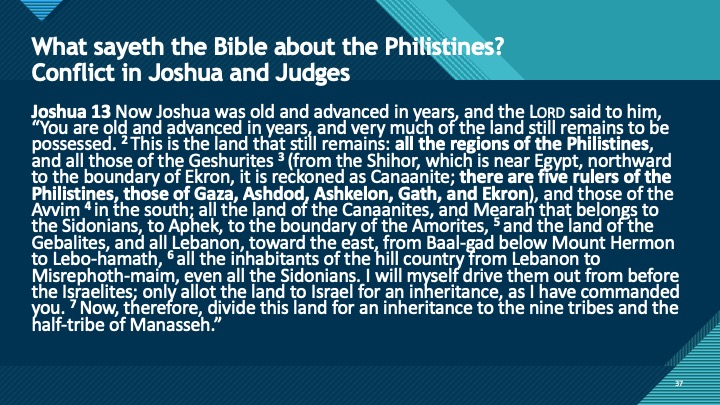
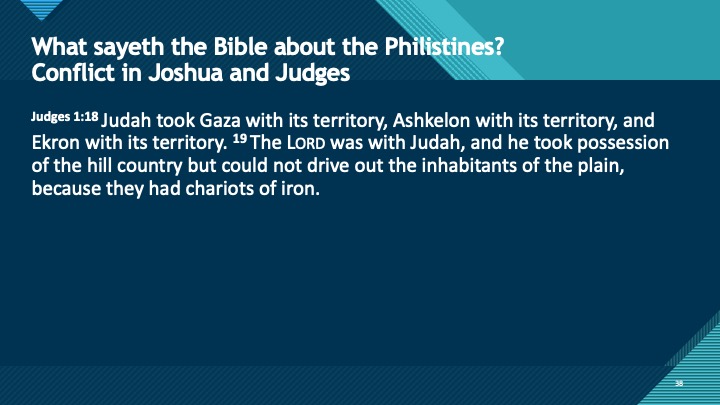
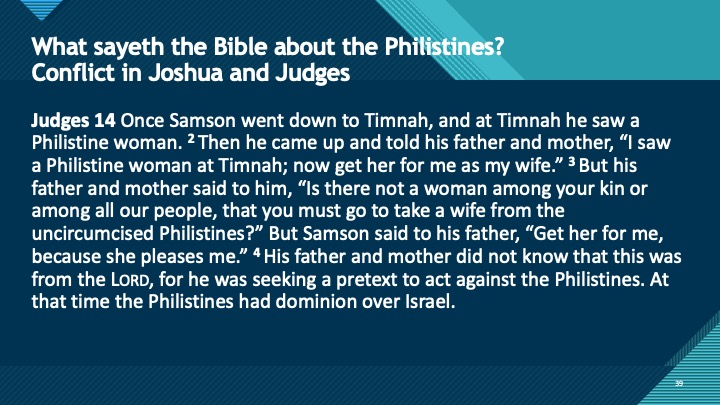
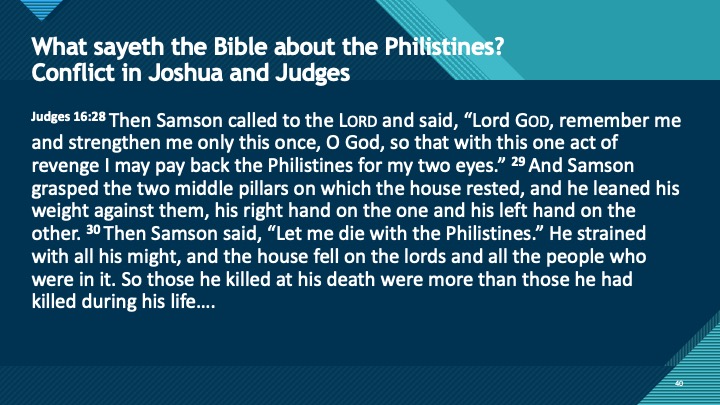
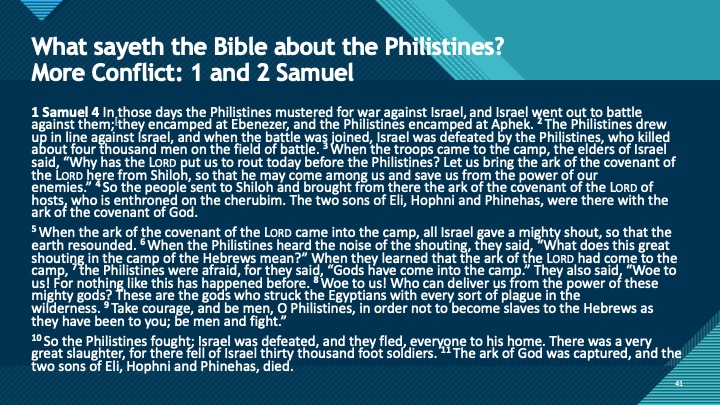
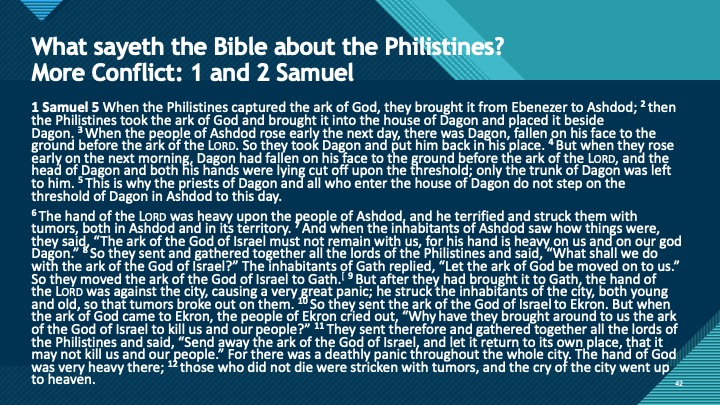
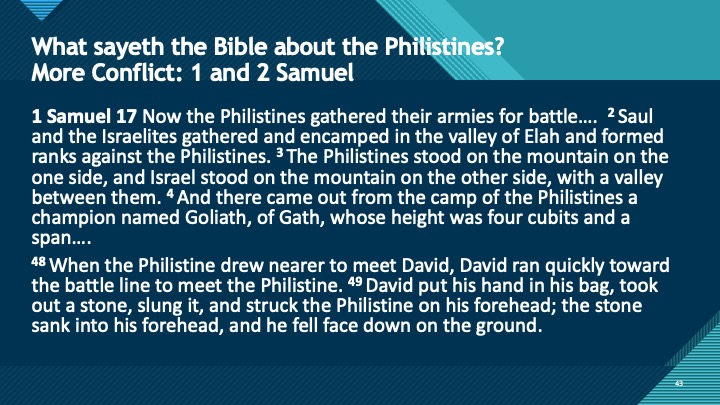
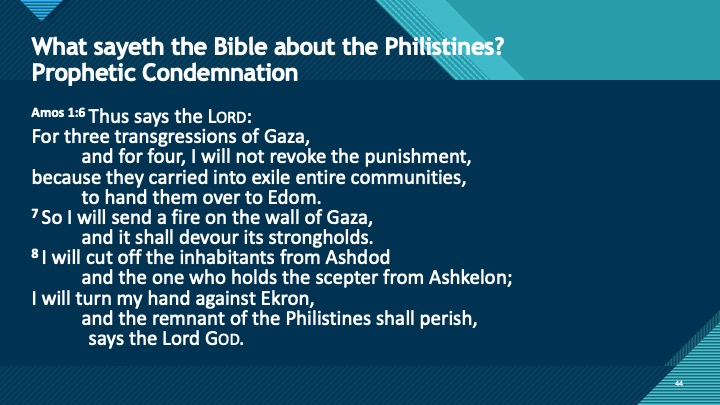
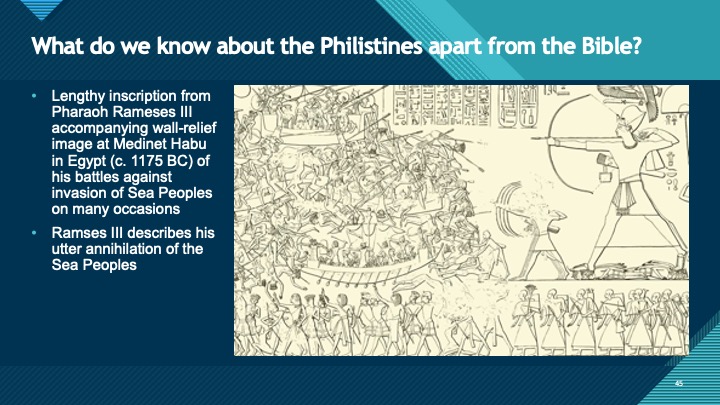
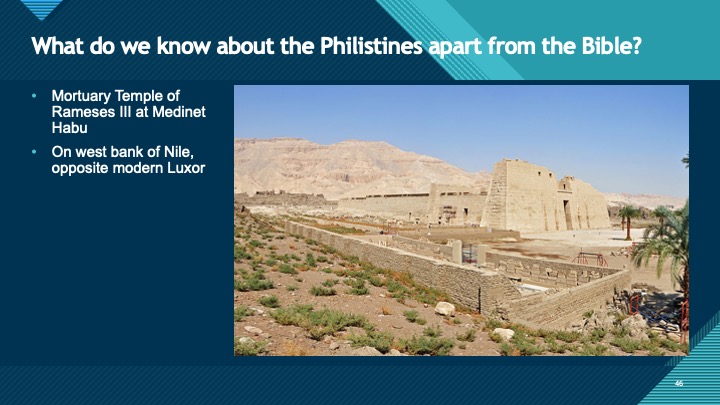
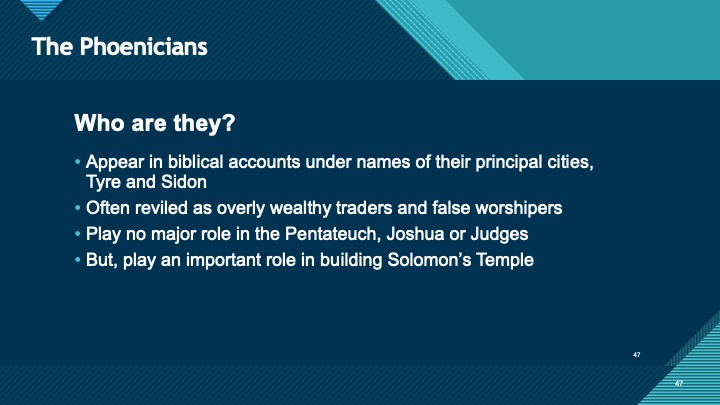
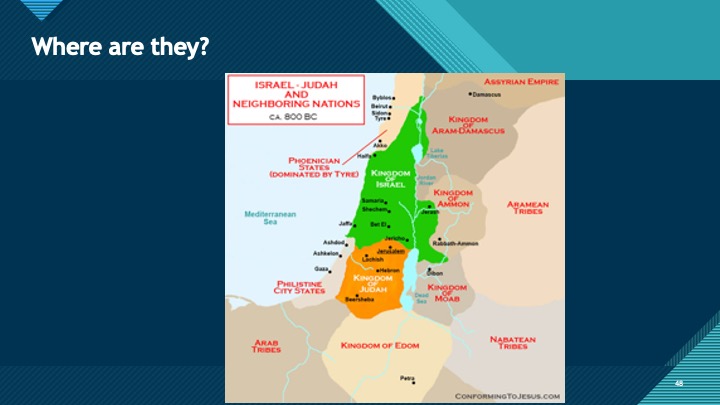
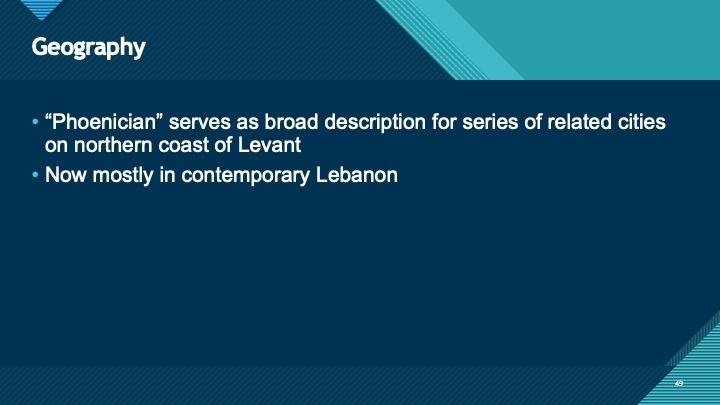
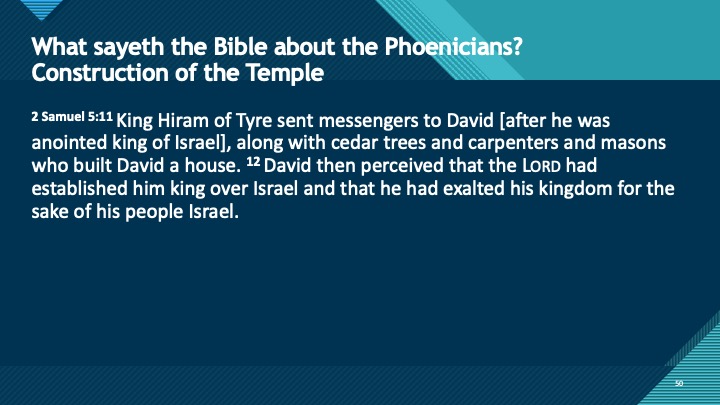
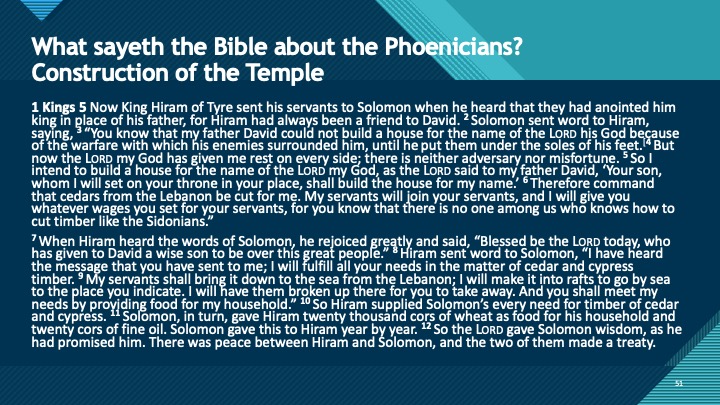
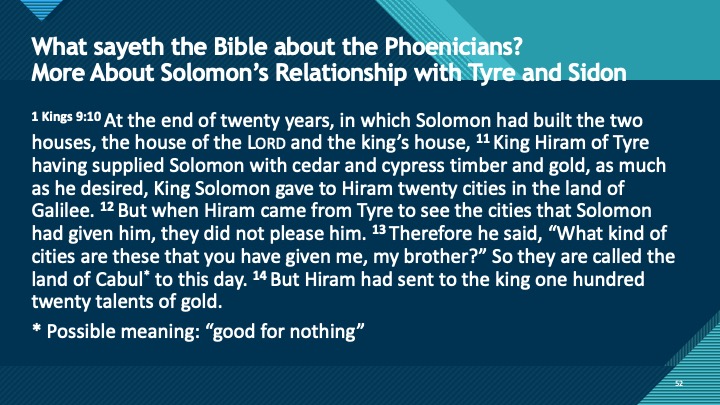
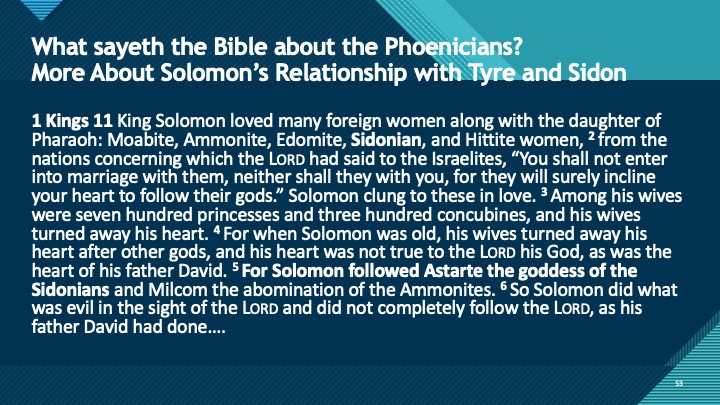
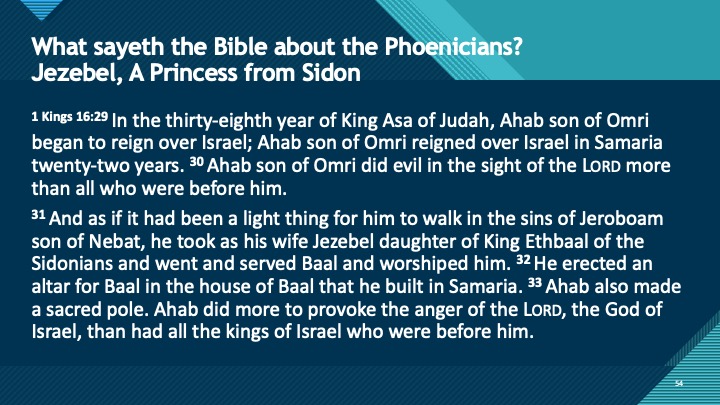
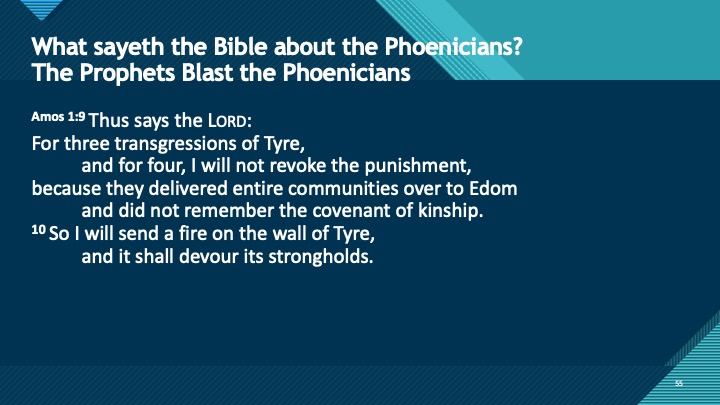
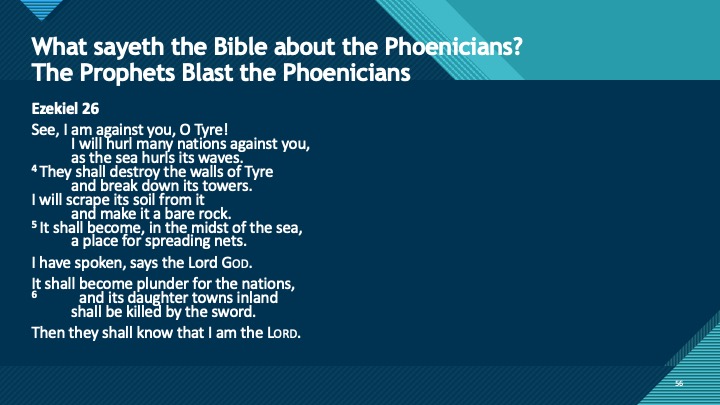
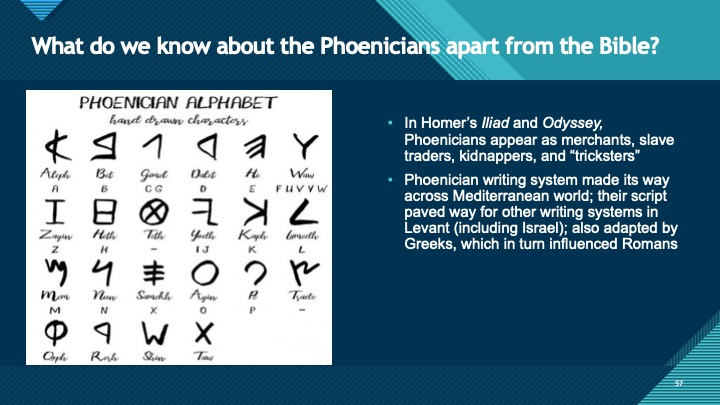
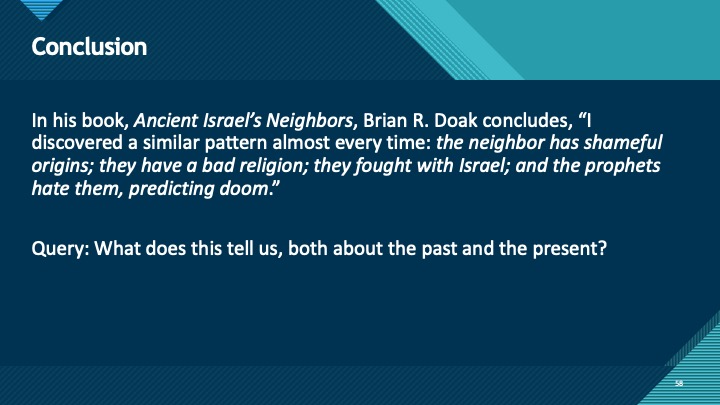
Ancient Israel's Neighbors - The Text
Ancient Israel’s Neighbors – The Text
Ancient Israel’s Neighbors
More “ites” (and others)!
The Moabites - Who are they?
• “The biblical Moabites originate in a less-than-noble story in the book of Genesis, going on to become an enemy of Israel throughout the monarchy and receiving sporadic prophetic condemnation.” Brian R. Doak, Ancient Israel’s Neighbors
• Along with Ammonites, incestuous descendants of Lot (Abraham’s nephew) and his daughters in Genesis 19
• BUT, Ruth, faithful heroine and ancestor of King David and Jesus, is a Moabite! No other biblical book besides Job is focused on a foreigner.
Geography
• Lies directly to east of Dead Sea (located in modern Jordan)
• Territory extended to southern border of Ammon
What sayeth the Bible about the Moabites?
Moab’s Shameful Origin
Genesis 19:30-38 (after the destruction of Sodom and Gomorrah) - 30 Now Lot went up out of Zoar and settled in the hills with his two daughters, for he was afraid to stay in Zoar, so he lived in a cave with his two daughters. 31 And the firstborn said to the younger, “Our father is old, and there is not a man on earth to come in to us after the manner of all the world. 32 Come, let us make our father drink wine, and we will lie with him, so that we may preserve offspring through our father.” 33 So they made their father drink wine that night, and the firstborn went in and lay with her father; he did not know when she lay down or when she rose. 34 On the next day, the firstborn said to the younger, “Look, I lay last night with my father; let us make him drink wine tonight also; then you go in and lie with him, so that we may preserve offspring through our father.” 35 So they made their father drink wine that night also, and the younger rose and lay with him, and he did not know when she lay down or when she rose. 36 Thus both the daughters of Lot became pregnant by their father. 37 The firstborn bore a son and named him Moab; he is the ancestor of the Moabites to this day. 38 The younger also bore a son and named him Ben-ammi; he is the ancestor of the Ammonites to this day.
What sayeth the Bible about the Moabites?
The Exodus
• Hebrews who escaped from Egypt must travel through Moab to get to the promised land.
• Deuteronomy 2: 8-9 - “When we had headed out along the route of the wilderness of Moab, 9 the Lord said to me, ‘Do not harass Moab or engage them in battle, for I will not give you any of its land as a possession, since I have given Ar as a possession to the descendants of Lot.’”
• Numbers 22-24: Though Israel did not attack Moab, Moabite king Balak “was in great dread” of vast number of people of Israel; summons Balaam, a “seer” of international reputation, to curse Israel so that they might be defeated. But thanks to his donkey, Balaam ultimately blesses Israel.
• Numbers 25: Hebrews have sex with Moabite women and worship their gods; God punishes with plague; plague ends when zealous Phinehas spears an Israelite and a Moabite woman “in the act”
• Moab can never be a friend to Israel:
Deuteronomy 23:3- 6 - 3 “No Ammonite or Moabite shall come into the assembly of the Lord even to the tenth generation. None of their descendants shall come into the assembly of the Lord forever, 4 because they did not meet you with food and water on your journey out of Egypt and because they hired against you Balaam son of Beor, from Pethor of Mesopotamia, to curse you. 5 (Yet the Lord your God refused to heed Balaam; the Lord your God turned the curse into a blessing for you, because the Lord your God loved you.) 6 You shall never promote their welfare or their prosperity as long as you live.”
• Israel camps in the plains of Moab before crossing into the promised land.
• Moses is shown the promised land from Mt. Nebo; dies in Moab and is buried there – “but no one knows the place of his burial to this day.”
What sayeth the Bible about the Moabites?
Judges and the Spiral of Apostasy
• Judges 3:12-14 - 12 The Israelites again did what was evil in the sight of the Lord, and the Lord strengthened King Eglon of Moab against Israel, because they had done what was evil in the sight of the Lord. 13 In alliance with the Ammonites and the Amalekites, he went and defeated Israel, and they took possession of the city of palms. 14 So the Israelites served King Eglon of Moab eighteen years.
What sayeth the Bible about the Moabites?
Ehud and Fat King Eglon
Judges 3: 15-23, 30 - 15 But when the Israelites cried out to the Lord, the Lord raised up for them a deliverer, Ehud son of Gera, a Benjaminite, a left-handed man. The Israelites sent tribute by him to King Eglon of Moab. 16 Ehud made for himself a sword with two edges, a cubit in length, and he fastened it on his right thigh under his clothes. 17 Then he presented the tribute to King Eglon of Moab. Now Eglon was a very fat man. 18 When Ehud had finished presenting the tribute, he sent the people who carried the tribute on their way. 19 But he himself turned back at the sculptured stones near Gilgal and said, “I have a secret message for you, O king.” So the king said, “Silence!” and all his attendants went out from his presence. 20 Ehud came to him, while he was sitting alone in his cool roof chamber, and said, “I have a message from God for you.” So he rose from his seat. 21 Then Ehud reached with his left hand, took the sword from his right thigh, and thrust it into Eglon’s belly; 22 the hilt also went in after the blade, and the fat closed over the blade, for he did not draw the sword out of his belly, and the dirt came out. 23 Then Ehud went out into the vestibule and closed the doors of the roof chamber on him and locked them…. 30 So Moab was subdued that day under the hand of Israel. And the land had rest eighty years.
What sayeth the Bible about the Moabites?
Ruth
• Set in “the days when the judges ruled”
• Elimelech, his wife Naomi, and their two sons leave Bethlehem in Judah for Moab because of famine.
• Elimelech dies; sons marry Moabite women; sons die
• Famine over; Naomi sets out for home but tells daughters-in-law to stay in their homeland
• Ruth: “Do not urge me to leave you or to return from following you. For where you will go, I will go, and where you lodge, I will lodge. Your people shall be my people and your God my God.”
• Back in Israel, Ruth meets and marries Boaz; their child Obed will be father of Jesse, father of David
What sayeth the Bible about the Moabites?
Solomon’s Errors
1 Kings 11:1-8 - King Solomon loved many foreign women along with the daughter of Pharaoh: Moabite, Ammonite, Edomite, Sidonian, and Hittite women, 2 from the nations concerning which the Lord had said to the Israelites, “You shall not enter into marriage with them, neither shall they with you, for they will surely incline your heart to follow their gods.” Solomon clung to these in love. 3 Among his wives were seven hundred princesses and three hundred concubines, and his wives turned away his heart. 4 For when Solomon was old, his wives turned away his heart after other gods, and his heart was not true to the Lord his God, as was the heart of his father David. 5 For Solomon followed Astarte the goddess of the Sidonians and Milcom the abomination of the Ammonites. 6 So Solomon did what was evil in the sight of the Lord and did not completely follow the Lord, as his father David had done. 7 Then Solomon built a high place for Chemosh the abomination of Moab and for Molech the abomination of the Ammonites on the mountain east of Jerusalem. 8 He did the same for all his foreign wives who offered incense and sacrificed to their gods.
What sayeth the Bible about the Moabites?
The Prophets Speak Oracles of Doom
• For example, Amos 2: 1-3:
Thus says the Lord:
For three transgressions of Moab,
and for four, I will not revoke the punishment,
because he burned to lime
the bones of the king of Edom.
2 So I will send a fire on Moab,
and it shall devour the strongholds of Kerioth,
and Moab shall die amid uproar,
amid shouting and the sound of the trumpet;
3 I will cut off the ruler from its midst
and will kill all its officials with him,
says
the Lord.
What do we know about the Moabites apart from the Bible?
The Mesha Stele/Mesha Stone
• c. 840 BC
• Discovered in 1868 in Moabite territory
• Primary, and only extended, example of Moabite language – 34 lines of text
• Celebrates Moabite King Mesha’s military, political, and religious achievements; Moab’s chief deity Kemosh/Chemosh plays prominent role
• Mesha fights against Israel in 2 Kings 3; Mesha Stele emphasizes victories over Israel; Kings account emphasizes Israel’s successful counterattacks
• In the Louvre in Paris since 1873
Mesha Stele Inscription*
(1) I am Mesha, son of Chemosh[ît], king of Moab, the Di-bonite. My father ruled over Moab thirty years, and I ruled after my father. I made this high-place for Chemosh in Qerihoh, high-pl[ace of salvation, for he saved me from all the kings and made me enjoy the sight of my enemies. Omri, king of Israel, oppressed Moab for a long time because Chemosh was angry with his country. His son succeeded him, and he also declared: “I will oppress Moab.” In my days, he declared thus,
but I enjoyed his view and that of his house: Israel was destroyed forever. Omri had taken possession of the land of Madaba, and he dwelt in it (during) his days and, (during) half of my days, his sons, forty years, but Chemosh restored it during my days. I built Baal-meon, and I made a reservoir in it; I built Kiriathain. The men of Gad dwelt in the land of Atarot from ancient times, and the king of Israel had built Atarot, but I fought against the city and took it; I killed the entire population.
The city belonged to Chemosh and to Moab, and I brought back from there the hearth-altar of his Well-Beloved, and I installed it before Chemosh in my capital. I settled there the men of Sharon and the men of Maharat. Chemosh said to me: “Go, take Nebo from Israel!” I went in the night, and I fought there from dawn until noon; I took it and killed everyone: seven thousand men, boys, women, [daught]ers and pregnant women, because I devoted it to Ashtar Chemosh. I took from there the hear altars of Yahweh, and I brought them before Chemosh. The king of Israel had built (19) Yahaz, and he lived there while fighting against me, but Chemosh drove him out before me to add it to Dibon. I built Qerihoh: the wall of its parks and the wall of the citadel; I built its gates, its towers, and a royal palace. I made the retaining walls of the water reservoir within the city. There had not been a cistern within the city, in Qerihoh, and I said to all the people: “Build for yourselves (25) a cistern, each one in his house!” I had Qerihoh’s ditches dug by Israelite prisoners. I built Aroer and made the road in the Arnon. I (re)built Beth-Bamoth because it had been destroyed. I (re)built Bezer because it was in ruins.
The men of Dibon (were) fitted out for war because all Dibon (is my) guard. I ruled over hundreds of cities that I added to the land. I built
(30) [the temple of Mada]ba, the temple of Diblaten, and the temple of Baal-meon. I transported there […] the small cattle of the land. The House of David* dwelt in Horonain and Chemosh said to me: “Go down, fight against Horonain!” I went down, [fought against the city and took it.] Chemosh restored it in my days, and I made up ten …
Ancient Israel's Neighbors - The Edomites
The Edomites - Who are they?
• Literally, Israel’s twin brother!
• Jacob/Israel and Esau/Edom
Geography
• Southernmost of Israel’s neighbors
• Lies primarily in contemporary Jordan
What sayeth the Bible about the Edomites?
Origin
Genesis 25:23 And the Lord said to her [Rebekah],
“Two nations are in your womb,
and two peoples born of you shall be divided;
the one shall be stronger than the other;
the elder shall serve the younger.”
24 When her time to give birth was at hand, there were twins in her womb. 25 The first came out red, all his body like a hairy mantle, so they named him Esau. 26 Afterward his brother came out, with his hand gripping Esau’s heel, so he was named Jacob. Isaac was sixty years old when she bore them.
Genesis 25:29 Once when Jacob was cooking a stew, Esau came in from the field, and he was famished. 30 Esau said to Jacob, “Let me eat some of that red stuff, for I am famished!” (Therefore he was called Edom.) 31 Jacob said, “First sell me your birthright.” 32 Esau said, “I am about to die; of what use is a birthright to me?” 33 Jacob said, “Swear to me first.” So he swore to him and sold his birthright to Jacob. 34 Then Jacob gave Esau bread and lentil stew, and he ate and drank and rose and went his way. Thus Esau despised his birthright.
Genesis 36:1-8 - These are the descendants of Esau, that is, Edom. 2 Esau took his wives from the Canaanites: Adah daughter of Elon the Hittite, Oholibamah daughter of Anah son of Zibeon the Hivite, 3 and Basemath, Ishmael’s daughter, sister of Nebaioth. 4 Adah bore Eliphaz to Esau; Basemath bore Reuel; 5 and Oholibamah bore Jeush, Jalam, and Korah. These are the sons of Esau who were born to him in the land of Canaan.
6 Then Esau took his wives, his sons, his daughters, and all the members of his household, his cattle, all his livestock, and all the property he had acquired in the land of Canaan, and he moved to a land some distance from his brother Jacob. 7 For their possessions were too great for them to live together; the land where they were staying could not support them because of their livestock. 8 So Esau settled in the hill country of Seir; Esau is Edom.
What sayeth the Bible about the Edomites?
The Exodus
Deuteronomy 2:2 Then the Lord said to me, 3 ‘You have been skirting this hill country long enough. Head north, and charge the people as follows: “You are about to pass through the territory of your kindred, the descendants of Esau, who live in Seir. They will be afraid of you, so be very careful 5 not to engage in battle with them, for I will not give you even so much as a foot’s length of their land, since I have given Mount Seir to Esau as a possession. 6 You shall purchase food from them for money, so that you may eat, and you shall also buy water from them for money, so that you may drink. 7 Surely the Lord your God has blessed you in all your undertakings; he knows your going through this great wilderness. These forty years the Lord your God has been with you; you have lacked nothing.” ’ 8 So we passed by our kin, the descendants of Esau who live in Seir….
• Israel’s Attitude toward the Edomites:
Deuteronomy 23:7 “You shall not abhor any of the Edomites, for they are your kin.”
• And yet: Books of Samuel and Kings portray kings of United Monarchy – Saul, David, and Solomon – as in constant conflict with Edom
• Prophets also heap abuse upon Edomites:
Isaiah 34:5,9 When my sword has drunk
its fill in the heavens,
upon Edom it will fall,
upon the people I have doomed to judgment….
And the streams of Edom shall be turned into pitch
and her soil into sulfur;
her land shall become burning pitch.
• Numbers 20 may explain the different tone:
Numbers 20:14 Moses sent messengers from Kadesh to the king of Edom, “Thus says your brother Israel: You know all the adversity that has befallen us, 15 how our ancestors went down to Egypt, and we lived in Egypt a long time, and the Egyptians oppressed us and our ancestors, 16 and when we cried to the Lord, he heard our voice and sent an angel and brought us out of Egypt, and here we are in Kadesh, a town on the edge of your territory. 17 Now let us pass through your land. We will not pass through field or vineyard or drink water from any well; we will go along the King’s Highway, not turning aside to the right hand or to the left until we have passed through your territory.”
18 But Edom said to him, “You shall not pass through, or we will come out with the sword against you.” 19 The Israelites said to him, “We will stay on the highway, and if we drink of your water, we and our livestock, then we will pay for it. It is only a small matter; just let us pass through on foot.” 20 But he said, “You shall not pass through.” And Edom came out against them with a large force, heavily armed. 21 Thus Edom refused to give Israel passage through their territory, so Israel turned away from them.
The Destruction of Jerusalem
• Though brought about directly by Babylon, Edom played some role in the destruction of Jerusalem and the Temple in 586 BC
• Ezekiel speaks of Edom acting “revengefully against the house of Judah” (Ezekiel 25:12) and “with wholehearted joy and utter contempt” plundering Judah (Ezekiel 36:5)
• Entire book of Obadiah devoted to reporting Edom’s role in destruction of Jerusalem, but characterized more as “standing aside” while Babylon plundered
• Psalm 137 puts it well:
7 Remember,
O Lord, against the Edomites
the day of Jerusalem’s fall,
how they said, “Tear it down! Tear it down!
Down to its foundations!”
8 O daughter Babylon, you devastator!
Happy shall they be who pay you back
what you have done to us!
9 Happy shall they be who take your little ones
and dash them against the rock!
What do we know about the Edomites apart from the Bible?
• Primary Edomite deity was Qos
• Longest Edomite inscription, likely from 6th century BC:
“Message of Lammelek, Speak to Bilbel: Is it well with you? Now I have blessed you to Qos. And now give the bread which is with Ahimmoh and Sha’ul shall offer it on the altar of Qos lest the bread become leavened.”
• Edomite three-horned figurine (6th century BC): a god or goddes
Ancient Israel's Neighbors - the Philistines.
The Philistines - Who are they?
• A contingent of the “Sea Peoples” who migrated to Eastern Mediterranean east in 13th and 12th centuries BC; origins uncertain but likely migrants from the Aegean
• Unlike Israel’s other neighbors, only one with large-scale origins entirely outside the Levant
• Overwhelmingly appear in conflict with Israel: e.g., Samson and Delilah; David and Goliath
Geography
• Coastal plain bordering Mediterranean Sea; narrow in north, widens out in south
• Offered access to international trade routes
• Major sites are cities of Gaza, Ashkelon, Ashdod, Gath, and Ekron (the Philistine “pentapolis”)
What sayeth the Bible about the Philistines?
Origin
• Presented as descendants of Ham with nonnative origins
6 The descendants of Ham: Cush, Egypt, Put, and Canaan. 7 The descendants of Cush: Seba, Havilah, Sabtah, Raamah, and Sabteca. The descendants of Raamah: Sheba and Dedan. 8 Cush became the father of Nimrod; he was the first on earth to become a mighty warrior. 9 He was a mighty hunter before the Lord; therefore it is said, “Like Nimrod a mighty hunter before the Lord.” 10 The beginning of his kingdom was Babel, Erech, Akkad, and Calneh in the land of Shinar. 11 From that land he went into Assyria and built Nineveh, Rehoboth-ir, Calah, and 12 Resen between Nineveh and Calah; that is the great city. 13 Egypt became the father of Ludim, Anamim, Lehabim, Naphtuhim, 14 Pathrusim, Casluhim, from whom the Philistines come, and Caphtorim.
Conflict in Joshua and Judges
Joshua 13 Now Joshua was old and advanced in years, and the Lord said to him, “You are old and advanced in years, and very much of the land still remains to be possessed. 2 This is the land that still remains: all the regions of the Philistines, and all those of the Geshurites 3 (from the Shihor, which is near Egypt, northward to the boundary of Ekron, it is reckoned as Canaanite; there are five rulers of the Philistines, those of Gaza, Ashdod, Ashkelon, Gath, and Ekron), and those of the Avvim 4 in the south; all the land of the Canaanites, and Mearah that belongs to the Sidonians, to Aphek, to the boundary of the Amorites, 5 and the land of the Gebalites, and all Lebanon, toward the east, from Baal-gad below Mount Hermon to Lebo-hamath, 6 all the inhabitants of the hill country from Lebanon to Misrephoth-maim, even all the Sidonians. I will myself drive them out from before the Israelites; only allot the land to Israel for an inheritance, as I have commanded you. 7 Now, therefore, divide this land for an inheritance to the nine tribes and the half-tribe of Manasseh.”
Judges 1:18 Judah took Gaza with its territory, Ashkelon with its territory, and Ekron with its territory. 19 The Lord was with Judah, and he took possession of the hill country but could not drive out the inhabitants of the plain, because they had chariots of iron.
Judges 14 Once Samson went down to Timnah, and at Timnah he saw a Philistine woman. 2 Then he came up and told his father and mother, “I saw a Philistine woman at Timnah; now get her for me as my wife.” 3 But his father and mother said to him, “Is there not a woman among your kin or among all our people, that you must go to take a wife from the uncircumcised Philistines?” But Samson said to his father, “Get her for me, because she pleases me.” 4 His father and mother did not know that this was from the Lord, for he was seeking a pretext to act against the Philistines. At that time the Philistines had dominion over Israel.
Judges 16:28 Then Samson called to the Lord and said, “Lord God, remember me and strengthen me only this once, O God, so that with this one act of revenge I may pay back the Philistines for my two eyes.” 29 And Samson grasped the two middle pillars on which the house rested, and he leaned his weight against them, his right hand on the one and his left hand on the other. 30 Then Samson said, “Let me die with the Philistines.” He strained with all his might, and the house fell on the lords and all the people who were in it. So those he killed at his death were more than those he had killed during his life….
More Conflict: 1 and 2 Samuel
1 Samuel 4 In those days the Philistines mustered for war against Israel, and Israel went out to battle against them;[they encamped at Ebenezer, and the Philistines encamped at Aphek. 2 The Philistines drew up in line against Israel, and when the battle was joined, Israel was defeated by the Philistines, who killed about four thousand men on the field of battle. 3 When the troops came to the camp, the elders of Israel said, “Why has the Lord put us to rout today before the Philistines? Let us bring the ark of the covenant of the Lord here from Shiloh, so that he may come among us and save us from the power of our enemies.” 4 So the people sent to Shiloh and brought from there the ark of the covenant of the Lord of hosts, who is enthroned on the cherubim. The two sons of Eli, Hophni and Phinehas, were there with the ark of the covenant of God.
5 When the ark of the covenant of the Lord came into the camp, all Israel gave a mighty shout, so that the earth resounded. 6 When the Philistines heard the noise of the shouting, they said, “What does this great shouting in the camp of the Hebrews mean?” When they learned that the ark of the Lord had come to the camp, 7 the Philistines were afraid, for they said, “Gods have come into the camp.” They also said, “Woe to us! For nothing like this has happened before. 8 Woe to us! Who can deliver us from the power of these mighty gods? These are the gods who struck the Egyptians with every sort of plague in the wilderness. 9 Take courage, and be men, O Philistines, in order not to become slaves to the Hebrews as they have been to you; be men and fight.”
10 So the Philistines fought; Israel was defeated, and they fled, everyone to his home. There was a very great slaughter, for there fell of Israel thirty thousand foot soldiers. 11 The ark of God was captured, and the two sons of Eli, Hophni and Phinehas, died.
1 Samuel 5 When the Philistines captured the ark of God, they brought it from Ebenezer to Ashdod; 2 then the Philistines took the ark of God and brought it into the house of Dagon and placed it beside Dagon. 3 When the people of Ashdod rose early the next day, there was Dagon, fallen on his face to the ground before the ark of the Lord. So they took Dagon and put him back in his place. 4 But when they rose early on the next morning, Dagon had fallen on his face to the ground before the ark of the Lord, and the head of Dagon and both his hands were lying cut off upon the threshold; only the trunk of Dagon was left to him. 5 This is why the priests of Dagon and all who enter the house of Dagon do not step on the threshold of Dagon in Ashdod to this day.
6 The hand of the Lord was heavy upon the people of Ashdod, and he terrified and struck them with tumors, both in Ashdod and in its territory. 7 And when the inhabitants of Ashdod saw how things were, they said, “The ark of the God of Israel must not remain with us, for his hand is heavy on us and on our god Dagon.” 8 So they sent and gathered together all the lords of the Philistines and said, “What shall we do with the ark of the God of Israel?” The inhabitants of Gath replied, “Let the ark of God be moved on to us.” So they moved the ark of the God of Israel to Gath.[ 9 But after they had brought it to Gath, the hand of the Lord was against the city, causing a very great panic; he struck the inhabitants of the city, both young and old, so that tumors broke out on them. 10 So they sent the ark of the God of Israel to Ekron. But when the ark of God came to Ekron, the people of Ekron cried out, “Why have they brought around to us the ark of the God of Israel to kill us and our people?” 11 They sent therefore and gathered together all the lords of the Philistines and said, “Send away the ark of the God of Israel, and let it return to its own place, that it may not kill us and our people.” For there was a deathly panic throughout the whole city. The hand of God was very heavy there; 12 those who did not die were stricken with tumors, and the cry of the city went up to heaven.
More Conflict: 1 and 2 Samuel
1 Samuel 17 Now the Philistines gathered their armies for battle…. 2 Saul and the Israelites gathered and encamped in the valley of Elah and formed ranks against the Philistines. 3 The Philistines stood on the mountain on the one side, and Israel stood on the mountain on the other side, with a valley between them. 4 And there came out from the camp of the Philistines a champion named Goliath, of Gath, whose height was four cubits and a span….
48 When the Philistine drew nearer to meet David, David ran quickly toward the battle line to meet the Philistine. 49 David put his hand in his bag, took out a stone, slung it, and struck the Philistine on his forehead; the stone sank into his forehead, and he fell face down on the ground.
Prophetic Condemnation
Amos 1:6 Thus says the Lord:
For three transgressions of Gaza,
and for four, I will not revoke the punishment,
because they carried into exile entire communities,
to hand them over to Edom.
7 So I will send a fire on the wall of Gaza,
and it shall devour its strongholds.
8 I will cut off the inhabitants from Ashdod
and the one who holds the scepter from Ashkelon;
I will turn my hand against Ekron,
and the remnant of the Philistines shall perish,
says
the Lord God.
What do we know about the Philistines apart from the Bible?
• Lengthy inscription from Pharaoh Rameses III accompanying wall-relief image at Medinet Habu in Egypt (c. 1175 BC) of his battles against invasion of Sea Peoples on many occasions
• Ramses III describes his utter annihilation of the Sea Peoples
Ancient Israel's Neighbors - The Phoenicians
The Phoenicians - Who are they?
• Appear in biblical accounts under names of their principal cities, Tyre and Sidon
• Often reviled as overly wealthy traders and false worshipers
• Play no major role in the Pentateuch, Joshua or Judges
• But, play an important role in building Solomon’s Temple
Geography
• “Phoenician” serves as broad description for series of related cities on northern coast of Levant
• Now mostly in contemporary Lebanon
What sayeth the Bible about the Phoenicians?
Construction of the Temple
2 Samuel 5:11 King Hiram of Tyre sent messengers to David [after he was anointed king of Israel], along with cedar trees and carpenters and masons who built David a house. 12 David then perceived that the Lord had established him king over Israel and that he had exalted his kingdom for the sake of his people Israel.
1 Kings 5 Now King Hiram of Tyre sent his servants to Solomon when he heard that they had anointed him king in place of his father, for Hiram had always been a friend to David. 2 Solomon sent word to Hiram, saying, 3 “You know that my father David could not build a house for the name of the Lord his God because of the warfare with which his enemies surrounded him, until he put them under the soles of his feet.[4 But now the Lord my God has given me rest on every side; there is neither adversary nor misfortune. 5 So I intend to build a house for the name of the Lord my God, as the Lord said to my father David, ‘Your son, whom I will set on your throne in your place, shall build the house for my name.’ 6 Therefore command that cedars from the Lebanon be cut for me. My servants will join your servants, and I will give you whatever wages you set for your servants, for you know that there is no one among us who knows how to cut timber like the Sidonians.”
7 When Hiram heard the words of Solomon, he rejoiced greatly and said, “Blessed be the Lord today, who has given to David a wise son to be over this great people.” 8 Hiram sent word to Solomon, “I have heard the message that you have sent to me; I will fulfill all your needs in the matter of cedar and cypress timber. 9 My servants shall bring it down to the sea from the Lebanon; I will make it into rafts to go by sea to the place you indicate. I will have them broken up there for you to take away. And you shall meet my needs by providing food for my household.” 10 So Hiram supplied Solomon’s every need for timber of cedar and cypress. 11 Solomon, in turn, gave Hiram twenty thousand cors of wheat as food for his household and twenty cors of fine oil. Solomon gave this to Hiram year by year. 12 So the Lord gave Solomon wisdom, as he had promised him. There was peace between Hiram and Solomon, and the two of them made a treaty.
More About Solomon’s Relationship with Tyre and Sidon
1 Kings 9:10 At the end of twenty years, in which Solomon had built the two houses, the house of the Lord and the king’s house, 11 King Hiram of Tyre having supplied Solomon with cedar and cypress timber and gold, as much as he desired, King Solomon gave to Hiram twenty cities in the land of Galilee. 12 But when Hiram came from Tyre to see the cities that Solomon had given him, they did not please him. 13 Therefore he said, “What kind of cities are these that you have given me, my brother?” So they are called the land of Cabul* to this day. 14 But Hiram had sent to the king one hundred twenty talents of gold.
* Possible meaning: “good for nothing”
1 Kings 11 King Solomon loved many foreign women along with the daughter of Pharaoh: Moabite, Ammonite, Edomite, Sidonian, and Hittite women, 2 from the nations concerning which the Lord had said to the Israelites, “You shall not enter into marriage with them, neither shall they with you, for they will surely incline your heart to follow their gods.” Solomon clung to these in love. 3 Among his wives were seven hundred princesses and three hundred concubines, and his wives turned away his heart. 4 For when Solomon was old, his wives turned away his heart after other gods, and his heart was not true to the Lord his God, as was the heart of his father David. 5 For Solomon followed Astarte the goddess of the Sidonians and Milcom the abomination of the Ammonites. 6 So Solomon did what was evil in the sight of the Lord and did not completely follow the Lord, as his father David had done….
Jezebel, A Princess from Sidon
1 Kings 16:29 In the thirty-eighth year of King Asa of Judah, Ahab son of Omri began to reign over Israel; Ahab son of Omri reigned over Israel in Samaria twenty-two years. 30 Ahab son of Omri did evil in the sight of the Lord more than all who were before him.
31 And as if it had been a light thing for him to walk in the sins of Jeroboam son of Nebat, he took as his wife Jezebel daughter of King Ethbaal of the Sidonians and went and served Baal and worshiped him. 32 He erected an altar for Baal in the house of Baal that he built in Samaria. 33 Ahab also made a sacred pole. Ahab did more to provoke the anger of the Lord, the God of Israel, than had all the kings of Israel who were before him.
The Prophets Blast the Phoenicians
Amos 1:9 Thus
says the Lord:
For three transgressions of Tyre,
and for four, I will not revoke the punishment,
because they delivered entire communities over to Edom
and did not remember the covenant of kinship.
10 So I will send a fire on the wall of Tyre,
and it shall devour its strongholds.
Ezekiel 26
See, I am against you, O Tyre!
I will hurl many nations against you,
as the sea hurls its waves.
4 They shall destroy the walls of Tyre
and break down its towers.
I will scrape its soil from it
and make it a bare rock.
5 It shall become, in the midst of the sea,
a place for spreading nets.
I have spoken, says the Lord God.
It shall become plunder for the
nations,
6 and its daughter towns inland
shall be killed by the sword.
Then they shall know that I am the Lord.
What do we know about the Phoenicians apart from the Bible?
• In Homer’s Iliad and Odyssey, Phoenicians appear as merchants, slave traders, kidnappers, and “tricksters”
• Phoenician writing system made its way across Mediterranean world; their script paved way for other writing systems in Levant (including Israel); also adapted by Greeks, which in turn influenced the Romans.
Ancient Israel's Neighbors - the Conclusion?
In his book, Ancient Israel’s Neighbors, Brian R. Doak concludes, “I discovered a similar pattern almost every time: the neighbor has shameful origins; they have a bad religion; they fought with Israel; and the prophets hate them, predicting doom.”
Query: What does this tell us, both about the past and the present?